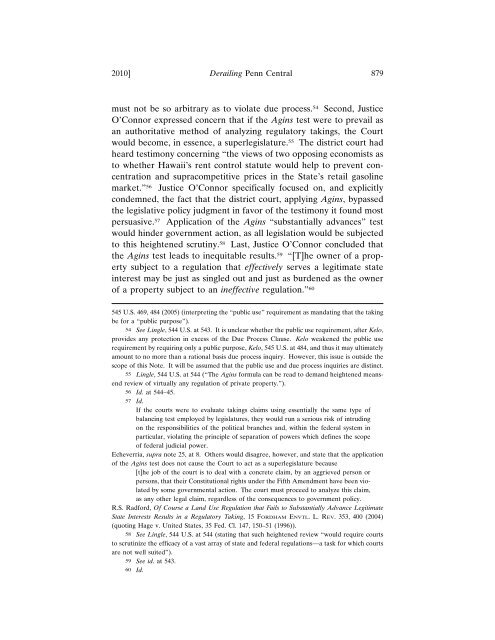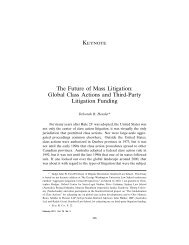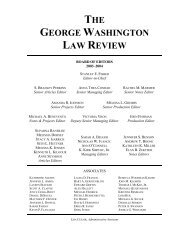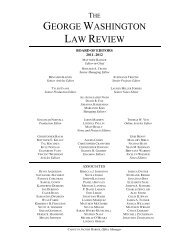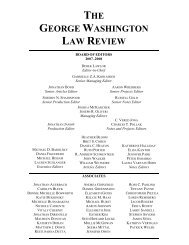View PDF - The George Washington Law Review
View PDF - The George Washington Law Review
View PDF - The George Washington Law Review
Create successful ePaper yourself
Turn your PDF publications into a flip-book with our unique Google optimized e-Paper software.
2010] Derailing Penn Central 879<br />
must not be so arbitrary as to violate due process. 54 Second, Justice<br />
O’Connor expressed concern that if the Agins test were to prevail as<br />
an authoritative method of analyzing regulatory takings, the Court<br />
would become, in essence, a superlegislature. 55 <strong>The</strong> district court had<br />
heard testimony concerning “the views of two opposing economists as<br />
to whether Hawaii’s rent control statute would help to prevent concentration<br />
and supracompetitive prices in the State’s retail gasoline<br />
market.” 56 Justice O’Connor specifically focused on, and explicitly<br />
condemned, the fact that the district court, applying Agins, bypassed<br />
the legislative policy judgment in favor of the testimony it found most<br />
persuasive. 57 Application of the Agins “substantially advances” test<br />
would hinder government action, as all legislation would be subjected<br />
to this heightened scrutiny. 58 Last, Justice O’Connor concluded that<br />
the Agins test leads to inequitable results. 59 “[T]he owner of a property<br />
subject to a regulation that effectively serves a legitimate state<br />
interest may be just as singled out and just as burdened as the owner<br />
of a property subject to an ineffective regulation.” 60<br />
545 U.S. 469, 484 (2005) (interpreting the “public use” requirement as mandating that the taking<br />
be for a “public purpose”).<br />
54 See Lingle, 544 U.S. at 543. It is unclear whether the public use requirement, after Kelo,<br />
provides any protection in excess of the Due Process Clause. Kelo weakened the public use<br />
requirement by requiring only a public purpose, Kelo, 545 U.S. at 484, and thus it may ultimately<br />
amount to no more than a rational basis due process inquiry. However, this issue is outside the<br />
scope of this Note. It will be assumed that the public use and due process inquiries are distinct.<br />
55 Lingle, 544 U.S. at 544 (“<strong>The</strong> Agins formula can be read to demand heightened meansend<br />
review of virtually any regulation of private property.”).<br />
56 Id. at 544–45.<br />
57 Id.<br />
If the courts were to evaluate takings claims using essentially the same type of<br />
balancing test employed by legislatures, they would run a serious risk of intruding<br />
on the responsibilities of the political branches and, within the federal system in<br />
particular, violating the principle of separation of powers which defines the scope<br />
of federal judicial power.<br />
Echeverria, supra note 25, at 8. Others would disagree, however, and state that the application<br />
of the Agins test does not cause the Court to act as a superlegislature because<br />
[t]he job of the court is to deal with a concrete claim, by an aggrieved person or<br />
persons, that their Constitutional rights under the Fifth Amendment have been violated<br />
by some governmental action. <strong>The</strong> court must proceed to analyze this claim,<br />
as any other legal claim, regardless of the consequences to government policy.<br />
R.S. Radford, Of Course a Land Use Regulation that Fails to Substantially Advance Legitimate<br />
State Interests Results in a Regulatory Taking, 15 FORDHAM ENVTL. L. REV. 353, 400 (2004)<br />
(quoting Hage v. United States, 35 Fed. Cl. 147, 150–51 (1996)).<br />
58 See Lingle, 544 U.S. at 544 (stating that such heightened review “would require courts<br />
to scrutinize the efficacy of a vast array of state and federal regulations—a task for which courts<br />
are not well suited”).<br />
59 See id. at 543.<br />
60 Id.


